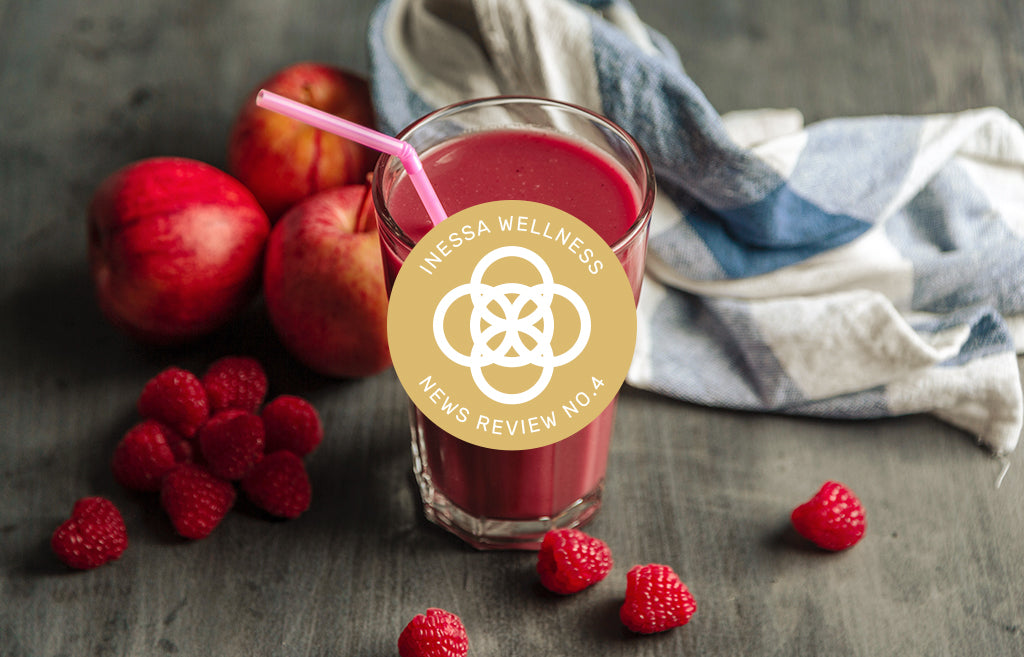Inessa News Review No.4

Our guest contributor, renowned nutrition writer, product developer, and media personality Shona Wilkinson shares articles that she’s read recently that may be of interest. From looking at the ‘dangers’ of fruit juice, Alexa potentially replacing your GP to the benefits of eating insects and the number one food that puts us at risk of heart disease, we hope you enjoy reading this selection of articles and Shona’s comments.
Fruit juices and sugary drinks linked to increased cancer risk; large study finds
This headline has caused a lot of scaremongering recently. A study has been released which monitored the intake of all drinks with high levels of sugar including 100% fruit juices and sugary fizzy drinks. The research found that each additional 100ml of any sugary drink per day increased cancer risk by 18%. An 18% increase corresponds to 4 extra cases of cancer per 1,000 people over a 5-year period. We already know that too much sugar is not good for us, so this isn’t anything new! What drew people’s attention was the fact that juices were mentioned.
We have to be so careful of sweeping statements – clearly there is a difference between a fresh green juice and a can of coke! However, we recommend that if you buy a juice check that it doesn’t have extra sugar added and consider diluting it due to its natural sugar content. If you like juices, consider making your own from fresh fruit and vegetables as they are far more nutritious and - even better - make a smoothie so you get the fibre as well.
Heart attacks: The number one food group that puts a person at risk - what is it?
This article discusses the dangers of eating trans fats and the problems it causes to cardiovascular health. Trans fat intake increases the build-up of plaque in the arteries which in turn increases the risk of heart attacks and strokes. What the article doesn’t do is explain exactly what trans fats are.
Trans fats are made by using heat and pressure to add hydrogen molecules to vegetable oils. This allows the oils to solidify at room temperature which gives a longer shelf life. It can be difficult to know what foods contain trans fats as they may be labelled as mono and diglycerides of fatty acids. The problem of whether your food contains trans fats or not is made harder due to the fact that unpackaged foods do not need to list their ingredients. Fast food, takeaways, and ready meals are notorious for their high trans-fat use. Many are now agreeing to reduce the use of trans fats and there is a call to ban the use of them totally. This hasn’t happened in the UK yet but there is pressure on the Government to pass this law.
Why Science Can Be So Indecisive About Nutrition
Many people are confused about nutrition - mainly because the advice they are given seems to be constantly changing and even contradictory! This article explains a few of the reasons for this. Firstly, nutritional studies and research are extremely difficult to do. It's very hard to figure out what people are actually eating, and food diaries tend to be highly inaccurate. Add the fact that study participants find it just as hard to stick to a diet as the rest of us and often ‘cheat’ without admitting it, all contributing to inaccurate results. Secondly, the variation of people’s responses to particular foods may also explain the circuitous route science has taken to establishing how certain foods affect health. What we need to accept is that we all have a unique response to food and there is no one diet which will work for every person.
Eating insects is good for you - and the planet
The population of the earth is increasing rapidly, and we need to feed everyone but what is the best way to do this? To meet the considerable challenge of ensuring food security for the future, it is imperative to find alternative and sustainable sources of protein, both for direct human consumption and for animal feed. We know that the billions of animals raised each year for food are putting increasing pressure on land and water resources and contributing to climate change and other negative environmental impacts. Well, insects could be the answer.
Insect production is environmentally friendly, and they provide a great source of protein for both humans and for animal feed. Insects are already eaten by a third of the world. They are starting to appear in our food in the UK – either in the form of insect flour or as insects themselves. Insects are actually highly nutritious, but we just need to get over the “ewwww” factor!

Amazon Alexa offering NHS health advice
The Government has announced that people will be able to get expert health advice using Amazon Alexa devices, under a partnership with the NHS. The idea behind this is that it will reduce the constant demand on the NHS. This is making many people nervous. Alexa obviously can’t replace a consultation with a GP and there is the concern that serious health conditions may be missed by people using Alexa rather than seeing their Doctor. There is also the issue of data protection although Amazon have stated that all data is encrypted and kept confidential. They also mention that customers are able to control their voice history and can review or delete recordings.



 Tara
Tara









